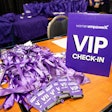
Being able to effectively communicate your work, thoughts and ideas to a group of people, whether big or small, will change the trajectory of your career. It is time to get comfortable with those sweaty palms of yours and start speaking up with confidence—whether you feel at ease or terrified.
Here are a few tips and strategies to improve and sharpen your public speaking skills:
There is no right amount of preparation, but be prepared.
You may be someone who feels more comfortable scripting your entire presentation, which is fine, as long as you are more of a theatrical performer. It is important that your audience perceives your message as authentic and natural, not rehearsed. If you are more like me, you may perform worse if you over prepare and try to memorize your message. It is critical that when you craft your presentation, you can answer the following questions: Is my point easy to understand? Will the audience feel what I want them to feel? And does my delivery have an engaging, organic flow or will this bore people to death?
Seize the right moments for speaking up.
One theory of leadership argues that the person who talks the most is considered the leader by the group. In contrast, the less one speaks, the less of a leader he or she appears to be. Though this can be true, oftentimes this style of leadership is limiting as it can create a one-man show instead of a collaborative discussion. This type of dynamic occurs frequently in boardrooms and in small group settings, where you tend to hear from the same people over and over again. Challenging as it may be, it is crucial that you seize opportunities in the conversation to interject and showcase your value, offering your perspective or ideas when they will provide value to the group. Don’t sell yourself short. You have good ideas, but people will never know unless you speak up and share.
Practice amplification and increase inclusiveness.
On the contrary, if you are someone who consistently shares your ideas with ease, level up your leadership through the practice of amplification by identifying and inviting quieter peers to contribute to the conversation. Not only does this create a more inclusive and collaborative environment, but it inspires a more diverse dialogue, leading to greater creativity and even productivity.
Listen to Rihanna, walk like Beyoncé and smile like you mean it.
Need I say more? Seriously though, it’s normal to be nervous before you speak in front of people because you’re practicing vulnerability (this is a good thing!). I love speaking in front of big audiences but surprisingly get nervous when presenting to smaller groups. Last year, before delivering a financial report to a board of directors, I was a nervous wreck. My palms were sweaty, my heart was pounding and deep breaths were not helping in the least. As I sat in the back of the room awaiting my turn, I discreetly slipped one headphone into my ear and turned on the most boss woman music I could think of. Not only did the sound of fierce beats ease my nerves, but it gave me the confidence boost I needed to perform. It never hurts to smile with intention, either. Fake it ‘til you make it, friends!
Oh great, half the audience is checking their email.
First of all, try to avoid assuming you know why people are on their phones. These days, most attendees are taking notes, capturing photos, posting quotes on Twitter, etc. Sure, some people might be bored or a little hungover from the networking event the night before, but try not to pay too much attention to distracted outliers. Focus on the captivated people in the audience, unless there really does seem to be an attention issue for the group. If that’s the case, observe and swerve, people. When there is a noticeable lack of interest in your presentation, shake things up and increase engagement by polling the audience, encourage them to have peer dialogue or direct questions at specific people (it’s okay to make Karen or Bill a little fidgety with anticipation if it transitions them from their phones to the edge of their seats).
You may not be for everyone, and that’s okay!
Every person has their own presentation style. Some speakers are really in-your-face-enthusiastic motivational types, some are heavily data-driven with charts and graphs, some are comedians, some make you cry and lots fall somewhere in between. You will never have an audience in which every single person loves what you say and how you say it. Just be yourself. Lots of people will admire you for that.
You got this! I know you do. When in doubt, know that your perspective and ideas matter, and that by improving the way you deliver those thoughts, you are challenging yourself to be better and setting yourself up for more opportunity and success. The world is ready to listen, you just have to start talking.

















